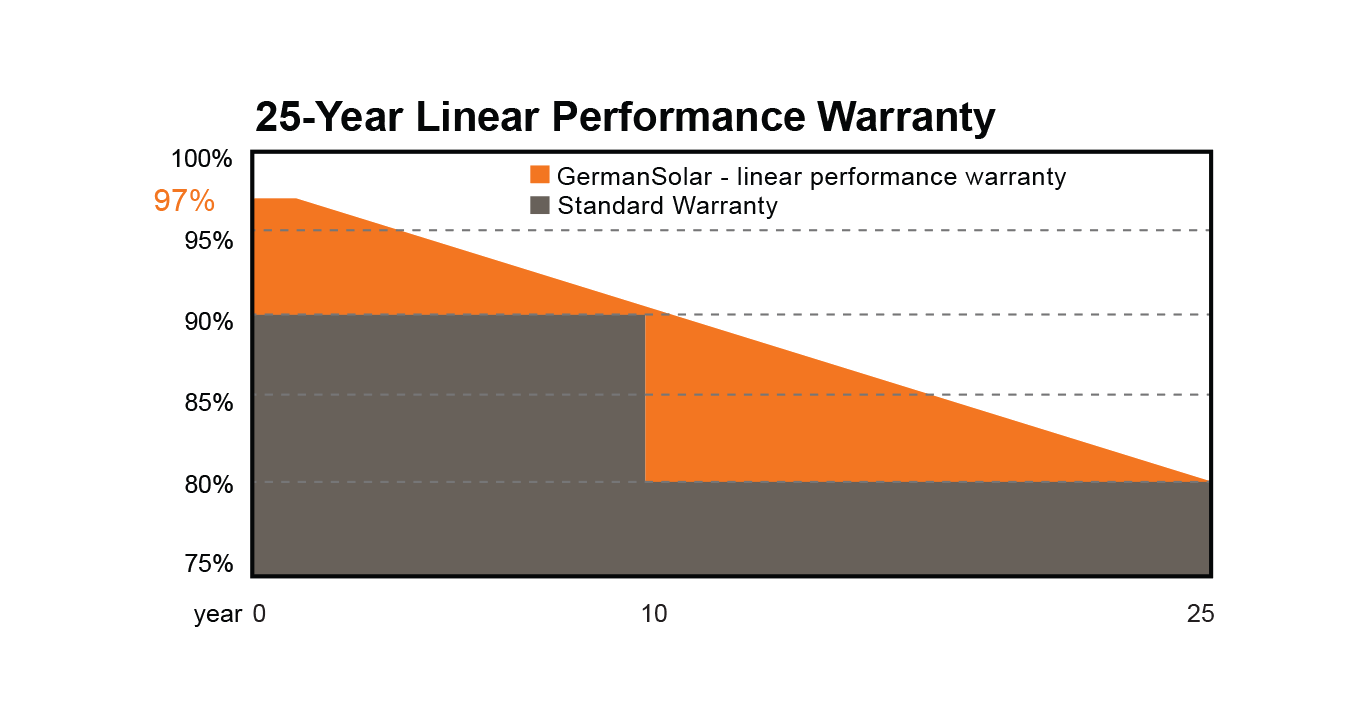Life. Don't it just get in the way.
So, solar panel life cycles, what's that all about? Put simply - they degrade, they
all degrade and a sales person telling you theirs are super-duper producing the same after 25 years as on day 1 is probably lying. Hmmm, how can we have 'probably' and the assertion that
all panels degrade in the same sentence? Let me explain.
Here's a typical Warranty graph:

First the dark grey part - this is how warranties on solar panels used to work (and some still do). From day 1 through to the end of the 10th year the manufacturer only guaranteed 90% of rated output dropping to 80% years 11-25. That's a bit crap, your 250 watt panels might only produce 225 on the day you switched them on. Your string of ten could have produced only 2.25kW instead of 2.5 kW
on day one. From year 11 on you might only see 2kW on those rare bright & sunny days.
Manufacturing techniques improved and reduced the variability out of the factory, also manufacturers started to 'bin' their panels, by which I mean they would test them and then sell them as 260 watt, 250, 240, 230 etc depending on their actual performance rather than 'we're trying to make 250 watt panels so we'll sell them all as that'. These two changes allowed linear warranties to be introduced, the orange area. Panels still degrade just the same but it's more predictable and steady.
All panels have a production warranty, ask to see yours before you buy. The above slope is 0.8% per year. The Canadian Solar panels I bought for my experimental array are 0.6% per year.
LG produce some that are warrantied at 0.25% per year, naturally these are more expensive up front.
So does this mean we are stuck with buying systems that only produce 'boilerplate' power when brand new (if at all) and get steadily crapper over time? No, we over-spec the panels to account for it.
Take for example
Enphase IQ7a micro-inverters. These are specified to work with panels ranging from 350 to 460+W which is a huge variability. So which panels do you choose? Although the input power is widely variable the output power, what the electronics can handle, is limited to 366W
1. So if we size our panels so that after x years they still produce 366W we're golden? Yes we are. Panels degrade but electronics do not, they either work or they fail. So choose panels that can run your inverter flat out for whatever the payback time of the system is. This is what the salesman who swears his magic panels don't degrade is doing, he's over-specking the panels so the customer doesn't see the degradation. Or he's not that clever and flat lying to you.
String inverters are the same, here's the data sheet for
Growatt string inverters. For inverters with max rated power output of 2500W they allow up to 2900W panel arrays. I get the feeling looking at the numbers the margins are not quite so generous on these string inverters, I could be wrong & I don't have the spoons right now to fully dive in.
After the system has paid for it who cares if there's degradation? Your system might produce 100% power for 10 years and pay for itself. In year 11 it starts to degrade by 0.8, 0.6 or even 0.25% per year, its still 100% free power, you are not going to match your household load that closely that such a small percentage makes a material difference. Sure you could have bought better quality or higher power panels up front but that would have cost more. The cost benefit relationship in that part of the system life is very hard to gauge. The CO2 manufacturing payback on solar panels, by the way, is so short it's not even a factor.
Less than a couple of years even if they are shipped half way round the world.
1Actually the spec is 366VA. Converting from VA to W is complicated and requires an understanding of power factors and imaginary power. No really, imaginary power is a real thing. Imaginary but real. That makes perfect sense. For simplicity I'm going to assume W=VA which in a lot of loads at home is near as makes no odds true.